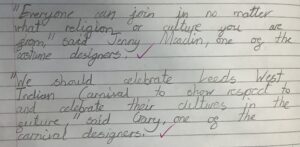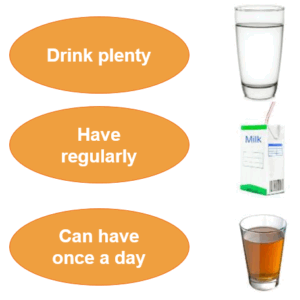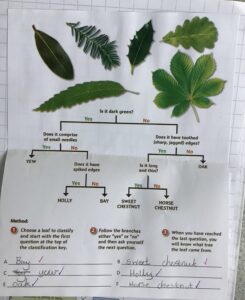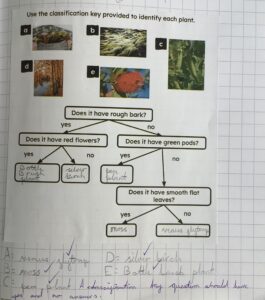Science: A smelly experiment!
For this unit of science, we are chemists. We are currently learning about reversible and irreversible changes; this lesson was focused on irreversible changes. Irreversible means ‘when a change cannot be undone to get the same substances back again’.
In groups, the children measured the starting components – vinegar and baking powder. Next, they added them together into a bottle, with a balloon on top, to collect the gas that was created (carbon dioxide). This was an irreversible reaction. The scientific enquiry type was comparative and fair tests.
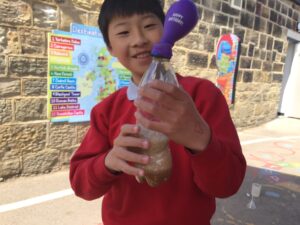
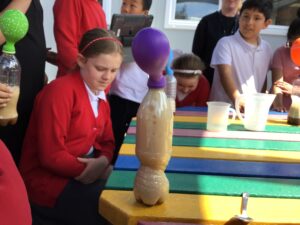
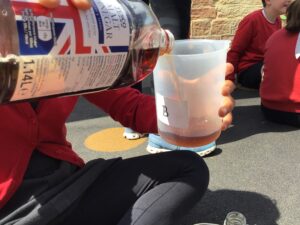
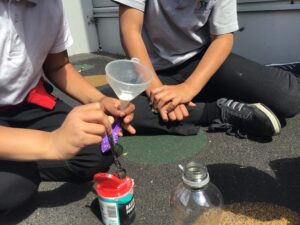
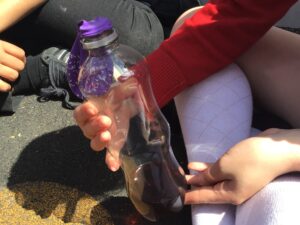
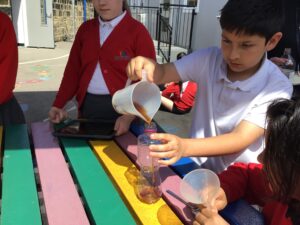
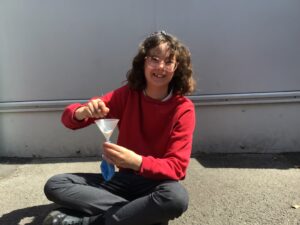
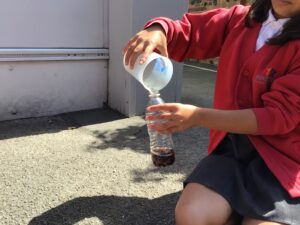
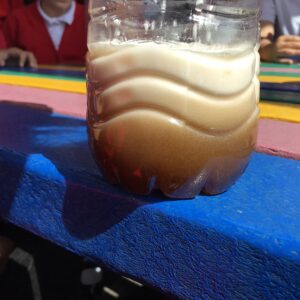
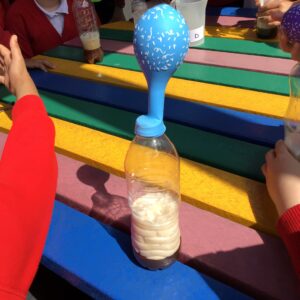
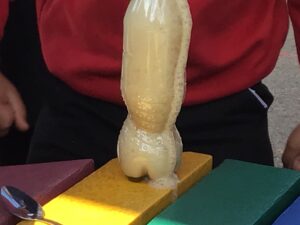
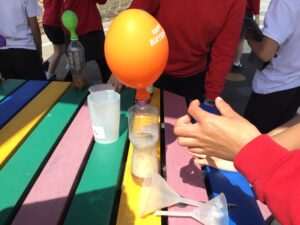
Help at home: Discuss other irreversible changes. For example, burning toast.
Reading: Refugees by Brian Bilston
This week, in Reading, we are focussing on the poem ‘Refugees’ by Brian Bilston. This poem is a palindrome. A palindrome is when a word, phrase, or sequence that reads the same backwards as forwards e.g. madam or nurses run.
We discussed our thoughts about the poem after reading it forwards and backwards. This poem was incredibly clever as the meaning changed depending on which way you read it.
Hadi said, “When we read it first we disliked the poem but when we read it from bottom to top I liked it.”
Nimrah said, “The poem is unfair because people had to evacuate from their countries and it wasn’t their fault. The poem read the opposite way made it seem like the poet really cared for people.”
Danny said, “When we first read the text, I found the poet unkind because he didn’t want to share things with refugees but when read the opposite way he was kind as he did actually want to share.”
Layla said, “I think the poet is clever because it doesn’t just talk about it in a bad way, it also talks about it in a good way.”
Help at home: Have a read of the poem – backwards and forwards – and discuss your thoughts.

Writing: Hot-Seat
In writing, we’re currently working on a piece of journalistic writing all about Leeds West Indian Carnival.
The purpose is to tell the news.
We’re learning about the carnival in our History topic at the moment so we know loads about it! A carnival is a festival that is made up of processions, dancing, music and costumes.
The R2s (remember tos) for our online news article are going to be:
- a headline
- subheadings
- main facts
- history of the carnival
- quotes
Today, we looked more closely at quotes. Your children did a hot-seat where they got to interview some people about the carnival. We then used the quotes gathered from these interviews to turn into direct speech.
Help at home: ask your child who founded the Leeds West Indian Carnival? Why did they start Leeds West Indian Carnival? What does Leeds West Indian Carnival involve?
Living and Learning: Healthy eating
Our latest Living and Learning theme has been all about healthy eating.
This video helps to explain the importance of healthy eating as part of living healthily. The Eatwell Guide is a key document to show how much of what we eat overall should come from each food group to achieve a healthy, balanced diet. The bigger the section the more food from that group we should eat. The balance of foods from each group does not need to be achieved with every meal but we should aim for the balance over a day or even a week.
We used the Eatwell Guide as part of a reading text too.

In our next Living and Learning session, we thought about the 5 a day message. Having at least 5 (ideally different) portions of fruit and vegetables keeps us healthy. These could be different types of fruit and vegetables and fresh, frozen, canned, juiced and dried all count.
 A portion is about a handful.
A portion is about a handful.

In our circle time on this theme, the children thought about what changes or swaps they could make to help them and their families eat healthier.
I could have more fruit or vegetables if I have a packed lunch.
I could have less chocolate and sweets.
You could add some sweetcorn or peas to your pasta for tea.
I could have more fruit and vegetables as a snack.
I could choose fruit instead of cake for my school dinner.
Help at home look at the Eatwell guide together and think about any improvements that could be made. This may be having an extra vegetable a day, trying a new fruit or vegetable, switching to brown bread or pasta or having a healthier snack after school.
More healthy eating ideas can be found by signing up to these Healthy Steps emails from Better Health (formally Change4Life).
Living and Learning: Healthy Eating
We have been looking at healthy eating in our Living and Learning lessons. This week, we have focussed on what a poor diet looks like and the consequences of this lifestyle.
The children first of all had to think about what might a unhealthy diet look like.




We then discussed what consequences there might be due to these poor diets. Help at home: Can you match the health risks to the meal plans?

The children finished off the lesson by creating a healthy meal plan, using their knowledge of the Eatwell Guide.
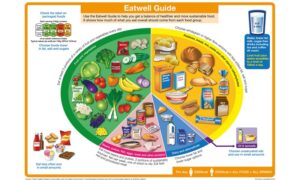
Living and Learning: healthy eating
In Living and Learning this week we have been talking about how to stay healthy. We have been thinking about how what we eat can help us to stay healthy. We have spoken about the importance of ‘five a day’ as well as looking at the eat well plate. We know we need a balanced diet to stay healthy.

You have to eat fruits and vegetable to be strong.
Fruit and vegetable are good for your heart.
You can not drink fizzy drinks.
Protein is good for and makes you healthy.
It is important to stay hydrated.
We also spoke about the importance of exercise and cleanliness in staying healthy. We also know that we need to take care of our mental health.
Help at home by discussing what you do as a family to be ‘happy and healthy’ at home.
SATs – well done!
This week, I couldn’t have been prouder of the class for their attitude, resilience and focus when completing their SATs.
It’s a testament to how hard they’ve worked so far this year that we went into each paper feeling confident (and competent)!
Breakfast club was a pleasure – the children were polite, grateful and tidy.
No matter their results, released in July, they can all hold their heads very high because of how they’ve carried themselves and that they’ve all tried their very best.
Well done, everybody.
Miss Wilson & the Y6 team
Summer 1: Week 4
Literacy
This week, we’ve been learning about tropical rainforests and the animals that live there. In literacy, we’ve been looking at the book Rumble in the Jungle by Giles Andraea and David Wojtowycz. When reading this book, we talked about what a poem is and enjoyed listening out for rhyming words. On Wednesday and Thursday we had a go at writing a dictated sentence about a rainforest animal.
 Caterpillars
Caterpillars
On Thursday morning, we had a lovely surprise. Two butterflies had nibbled their way out of their chrysalises! We are waiting patiently for the other three.
 Maths
Maths
This week, we continued to develop our understanding of the composition of numbers to 10 using different representations. To help deepen our understanding about the ‘whole’ being made up of smaller parts, we used practical experiences. We used the counting rhyme, ’10 fat sausages’ to investigate different ways to represent 10. We also used our fingers, 10-frames and Hungarian number patterns to begin to explore ‘5 and a bit’ numbers to 10.

 Help at home: Using a frying pan and ten objects to represent the ’10 fat sausages’, sing the song with somebody at home. Each time a sausage goes bang, encourage your child to talk about what they can see. How many sausages are in the pan? How many sausages have gone bang? How many altogether?
Help at home: Using a frying pan and ten objects to represent the ’10 fat sausages’, sing the song with somebody at home. Each time a sausage goes bang, encourage your child to talk about what they can see. How many sausages are in the pan? How many sausages have gone bang? How many altogether?
Poetry Picnic
This week’s poem is A Little Shell. Click here to watch us perform the poem.
Take a look at some other wonderful learning…





 Reminder!
Reminder!
Your child must be reading their e-books on a regular basis. Your children can read previous e-books to help with their fluency skills. When your child has read their e-books, please you write a quick message in their reading records. This allows us to see how they’re getting on at home.
I hope you have a happy and healthy weekend in the sunshine!
Living & Learning: keeping hydrated
As part of our L&L focus on healthy eating, Year 4 have been learning about hydration and why its so important.
Our body is nearly two-thirds water, so we must make sure we keep it full of fluids and stay hydrated. Water is essential for life, and it is important to get the right amount of fluid to be healthy.
Hydration can be defined as replacing the lost fluid, particularly water, in something. Therefore, when we do exercise or enjoy the warm weather we must be extra careful to stay hydrated as we lose more water in sweat.
Remember to always bring a water bottle to school – especially now the suns out!
We can get fluids from many different liquids:
- Water is the best choice because it hydrates us without adding sugar or damaging teeth.
- Milk is a useful source of nutrients like calcium, vitamins and proteins.
- Fruit/vegetable juices and smoothies provide water plus some vitamins, minerals and fibre. However, they are also high in natural sugars!
Help at home: test your child’s hydration knowledge using these questions…
1. Roughly, what percentage of water comes from foods?
- 0%
- 10%
- 15%
- 20%
2. Which of the following is the drink recommended to be consumed the most frequently?
- Water
- Milk
- Sugary drinks
- Sports and energy drinks
3. Why is it recommended that children should avoid sugary drinks?
- They contain less fluid
- The sugar can potentially damage teeth
- They do not contain caffeine
- They contain more vitamins
4. Which of the following are likely to increase your fluid requirements?
- A cold day
- Partaking in vigorous exercise
- Watching TV
- All of the above
Science: classification keys
We are biologists!
This half-term Year 4 are learning about our second unit of biology:
Living things and their habitats!
As part of this topic, your children have been revisiting classification keys. Classification keys are used to sort living things according to their characteristics.
We discussed what makes a good classification key question…
It must be a closed (yes or no) question.
It must be about an observable characteristic.
It must not be based on opinion.
Year 4 have been using and creating classification keys to help them identify a variety of unknown animals and plants.
Help at home: go outside (in your garden or local park) and pick 4 different plants. Can your child create a classification key to sort these plants?

